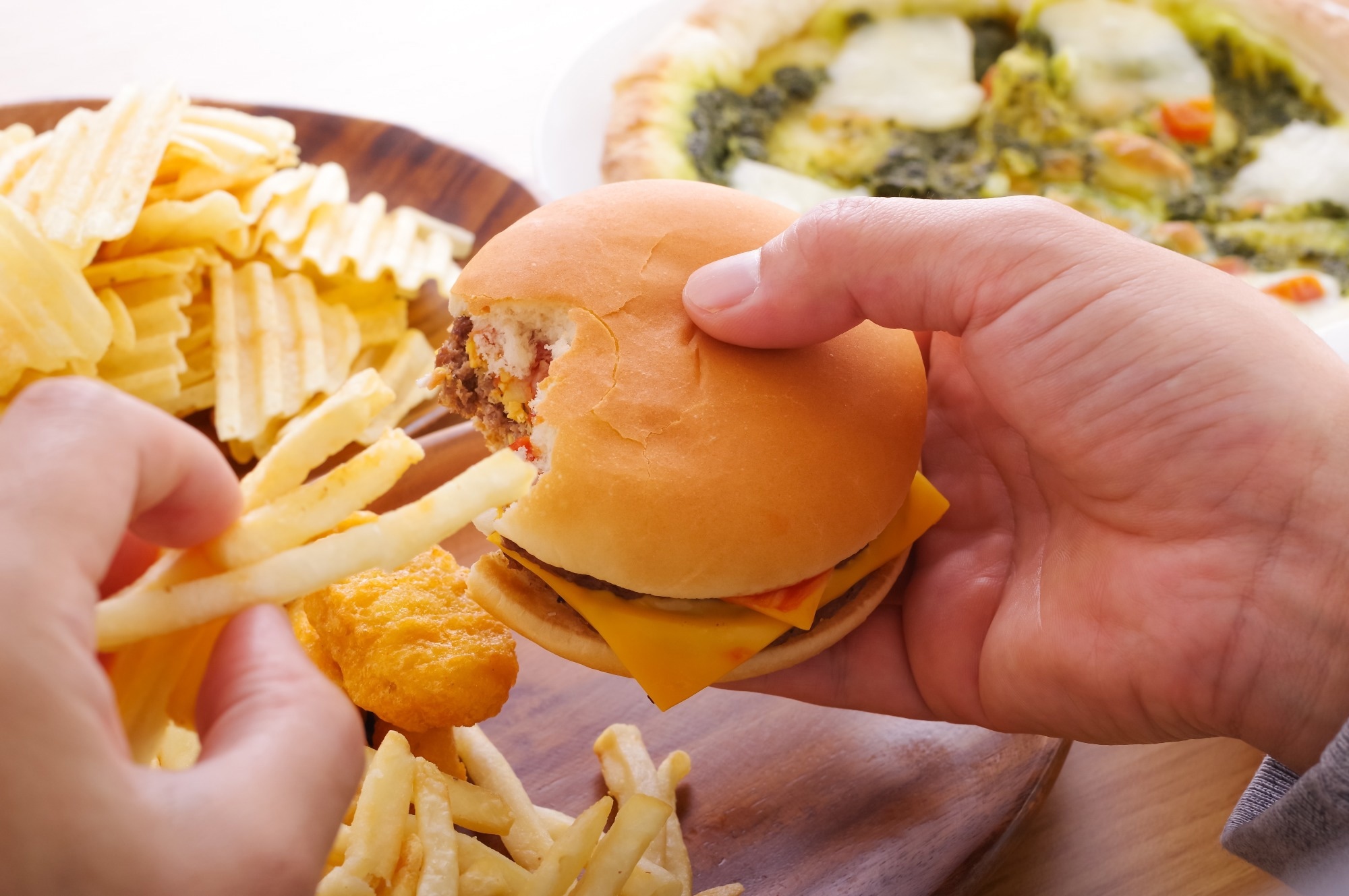Their findings indicate that higher UPF intake is associated with an increased risk of all-cause mortality and GI cancer mortality, emphasizing the need for dietary interventions.
 Study: Ultra-Processed Food Consumption as a Risk Factor for Gastrointestinal Cancer and Other Causes of Mortality in Southern Italy: A Competing Risk Approach. Image Credit: beauty-box/Shutterstock.com
Study: Ultra-Processed Food Consumption as a Risk Factor for Gastrointestinal Cancer and Other Causes of Mortality in Southern Italy: A Competing Risk Approach. Image Credit: beauty-box/Shutterstock.com
Background
Previous research has identified chronic diseases such as cancer, type 2 diabetes, and cardiovascular disease as leading drivers of mortality worldwide, with diet being a significant modifiable factor for prevention.
UPFs now make up between 30% and 50% of daily caloric intakes globally, increasing even in Mediterranean regions traditionally known for healthier diets.
The Nova classification highlights the industrially manufactured nature of UPFs, often with deconstructed food components and additives, and high in sugars and fats but lacking in nutrients.
Studies have linked UPF consumption to various health risks, including gut dysbiosis and increased cancer risk, particularly colorectal cancer.
Despite these findings, gaps remain in understanding the impact of UPF consumption on mortality from all causes and GI cancers.
About the study
This study aimed to address existing research gaps by investigating how UPF consumption is linked to mortality in a population in southern Italy.
The study recruited 4,870 participants from two cohorts in Southern Italy. The Minerals and Cardiovascular Outcomes in Longitudinal (MICOL) study included subjects randomly selected from electoral rolls in Castellana Grotte, followed over multiple years, while the Nutrition and Hepatology (NUTRIHEP) study included adults from general practitioner registries in Putignano.
Participants provided informed and written consent and provided interviews with sociodemographic, health, lifestyle, and dietary information using the European Prospective Investigation on Cancer (EPIC) Food Frequency Questionnaire (FFQ).
Physical measurements such as weight, height, and blood pressure were taken, and fasting blood samples were analyzed for biochemical markers.
UPF consumption was assessed and categorized according to the Nova classification, grouping foods by their level of processing. The study participants were divided into quartiles based on their daily UPF intake.
Cox proportional hazards regression and competing risk models were used to analyze the relationship between UPF consumption and mortality outcomes, adjusting for age, gender, body mass index (BMI), marital status, job, smoking, daily caloric intake, and alcohol intake.
The analysis aimed to estimate hazard ratios (HRs) and subdistribution hazard ratios (SHRs) for all-cause mortality and specific causes of death, including cardiovascular disease, GI, and other cancers.
Findings
During the study period, 935 participants (19.2%) died, and the incidence rate was 33.9 deaths per 1,000 person-years over a total of 27,562.3 person-years.
Among the deceased, 271, or 29.5%, died from cardiovascular diseases, while 268, or 28.7%, died from various cancers. Of these, 105 or 11.2% passed away from gastrointestinal cancers (including 22 colon cancers, 34 liver and intrahepatic bile duct cancers, and 20 pancreatic cancers), and 396 (42.3%) from other causes.
Further analysis revealed that, compared to the lowest UPF quartile, those in the third quartile showed a 27% higher risk of mortality from all causes (SHR 1.27), while those in the highest quartile had a 34% higher risk (SHR 1.34).
Specifically, for GI cancer mortality, the risk was significantly elevated in the second quartile (SHR 1.65) and the fourth quartile (SHR 3.14), indicating a dose-dependent relationship. Additionally, the third quartile showed a 61% higher risk for other forms of cancer (SHR 1.61).
These results highlight a substantial link between higher UPF consumption and increased mortality risk, particularly from GI cancers, emphasizing the importance of dietary interventions to reduce UPF intake.
Conclusions
The findings of this study support previous research by demonstrating a positive, dose-dependent association between UPF consumption and gastrointestinal cancer incidence, as well as mortality from all causes.
This study underscores the increasing risk linked to higher UPF intake, particularly among younger individuals in Mediterranean countries where UPF consumption is rising due to affordability and convenience.
The study's strengths include using a competing risk approach and reliable cancer registry data. At the same time, its limitations involve potential residual confounding and the inability of baseline food frequency questionnaires to capture the extent of food processing fully.
Comparatively, prior studies have established links between UPF consumption and various cancers and metabolic diseases, such as colorectal and breast cancer and type 2 diabetes. The high caloric density, added sugars, and fats in UPFs contribute to obesity and other metabolic issues, which are significant risk factors for chronic diseases.
Future research should aim to clarify the causal mechanisms between UPFs and health outcomes, considering factors like nutritional quality and the impact of food additives.
Public health interventions and dietary education programs are crucial to mitigate UPF-related health risks and promote traditional Mediterranean dietary patterns.
Journal reference:
-
Campanella, A., Tatoli, R., Bonfiglio, C., Donghia, R., Cuccaro, F., Giannelli, G. (2024) Ultra-processed food consumption as a risk factor for gastrointestinal cancer and other causes of mortality in southern Italy: a competing risk approach. Nutrients. doi:https://doi.org/10.3390/nu16131994. https://www.mdpi.com/2072-6643/16/13/1994